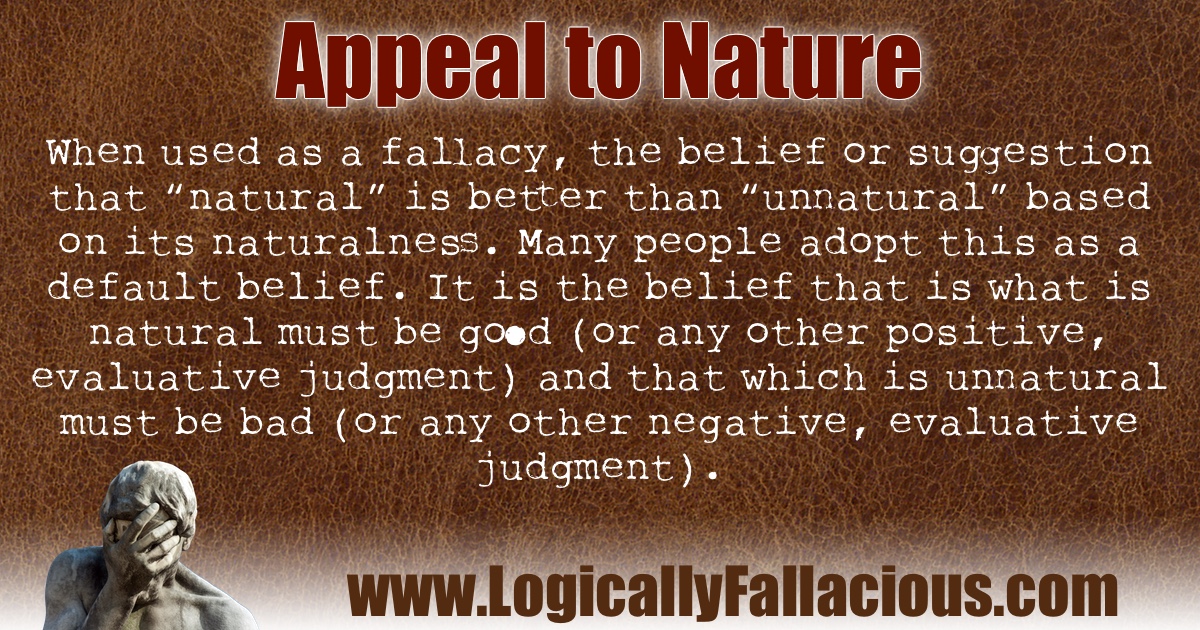Argumentum ad Naturam
Description: When used as a fallacy, the belief or suggestion that “natural” is better than “unnatural” based on its naturalness. Many people adopt this as a default belief. It is the belief that is what is natural must be good (or any other positive, evaluative judgment) and that which is unnatural must be bad (or any other negative, evaluative judgment).
The appeal to nature fallacy is often confused with the naturalistic fallacy and the moralistic fallacy because they are quite similar. The appeal to nature, however, specifically references “natural” or “unnatural” and can also make a non-moral judgment such as “beautiful” or “destructive.”
Logical Forms:
X is natural.
Y is not natural.
Therefore, X is better than Y.
That which is natural is good, right, beautiful, etc.
X is natural.
Therefore, X is good, right, beautiful, etc.
That which is unnatural is bad, wrong, destructive, etc.
X is unnatural.
Therefore, X is bad, wrong, destructive, etc.
Example #1:
I shop at Natural Happy Sunshine Store (NHSS), which is much better than your grocery store because at NHSS everything is natural including the 38-year-old store manager’s long gray hair and saggy breasts.
Explanation: I can appreciate natural food and products as much as the next granola-eating guy, but to make any claim of “betterness”, one needs to establish criteria by which to judge. Perhaps not paying almost twice as much for the same general foods is “better” for me. Perhaps I prefer a little insecticide on my apple to insects inside my apple, and maybe I like faux brunettes with perky breasts due to “unnatural” bra support.
Natural is not always “better”.
Example #2:
Cocaine is all natural; therefore, it is good for you.
Explanation: There are very many things in this world that are “all natural” and very bad for you besides cocaine, including, earthquakes, monsoons, and viruses, just to name a few. Whereas “unnatural” things such as aspirin, pacemakers, and surgery can be very good things.
Exception: There are many natural things that are better than unnatural, but they must be evaluated based on other criteria besides the “naturalness”.
Fun Fact: Mother Nature is the kind of mother who wouldn’t hesitate to throw you in a dumpster and leave you there to die.
Variation: The naturalistic fallacy can be seen as a subset of the appeal to nature, or a more specific version that makes a moralistic value claim rather than the more generic claim of goodness. For example, saying that cocaine is good for you because it is natural is an example of the appeal to nature. This has nothing to do with morality, but with health. Saying that polyamorous behavior (having multiple sexual partners) is morally good because it seems to be in line with our natural tendencies is an example of the naturalistic fallacy. If one were to say that the first example was an example of the naturalistic fallacy, they would be incorrect. If one were to argue that the second was an example of the appeal to nature, they wouldn't be wrong (if they are equating moral actions with goodness), but they could be more accurate. Just as some dogs are Great Danes but not all dogs are Great Danes, some appeals to nature can be naturalistic fallacies, but not all appeals to nature are naturalistic fallacies.
